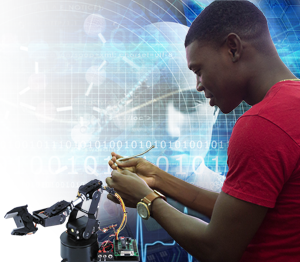
 Biomedical engineering is an interdisciplinary field in which engineering techniques are applied to solve problems in medicine and healthcare technologies. Biomedical engineers use microcomputers, lasers, and other materials to develop and improve medical research equipment that are used to diagnose or treat health problems. They may be involved in the design and engineering of medical products and equipment, for which they must have a firm understanding of biomechanics and neurophysiology. Areas of specialization are usually pursued at the graduate level and include the following areas: Bioinstrumentation; Biomechanics; Clinical Engineering; Systems Physiology; Biomaterials; and Rehabilitation engineering:
Biomedical engineering is an interdisciplinary field in which engineering techniques are applied to solve problems in medicine and healthcare technologies. Biomedical engineers use microcomputers, lasers, and other materials to develop and improve medical research equipment that are used to diagnose or treat health problems. They may be involved in the design and engineering of medical products and equipment, for which they must have a firm understanding of biomechanics and neurophysiology. Areas of specialization are usually pursued at the graduate level and include the following areas: Bioinstrumentation; Biomechanics; Clinical Engineering; Systems Physiology; Biomaterials; and Rehabilitation engineering:
This 3-year BSc. Biomedical Engineering programme has a strong focus on the design, operation and maintenance of biomedical instruments, particularly those frequently used in our health care institutions. The types of instruments used for treatment has evolved rapidly, and includes radiotherapy machines, pacemakers, cardiac-assist devices, intelligent drug delivery systems, and lasers for surgery. Biomedical engineers serves as an interface between traditional engineering disciplines and living systems. They may specialize in either aspect - applying the patterns of living organisms to engineering design or engineering new approaches to human health.
This programme strongly emphasize teaching laboratories and project designs. The practical application and testing of the concepts presented in the theoretical classes for that semester will be explored in these laboratory sessions. Engineering students learn through a combination of design and laboratory work. This mix of theory and practical application allows students to think things through and then apply their ideas in a variety of real life situations. Students also learn to diagnose problems and develop a variety of solutions.
Graduates from the Engineering programs in the Faculty of Engineering are expected to attain or achieve the following Program Educational Objectives within a few years of graduation:
The programme's courses are separated into three levels, click on the link for more details on the courses.
View Courses
The Degree Outline contains the information required for students to complete their degree. Click on the link for more details on the degree outline:
View Degree Outline
Students successfully completing the BSc Biomedical Engineering programme should have the ability to:
Admissions
Applicants must meet the University’s matriculation requirements and the Faculty's entry requirments.
Tuition
View tuition fees for admission to the B.SC. in Biomedical Engineering programme.
Apply Now